
Alexander Sergeyevich Pushkin; 6 June [O.S. 26 May] 1799 - 10 February [O.S. 29 January] 1837) was a Russian poet, playwright, and novelist of the Romantic era who is considered by many to be the greatest Russian poet and the founder of modern Russian literature.
Pushkin was born into Russian nobility in Moscow. His matrilineal great-grandfather was Abram Petrovich Gannibal, who was kidnapped from what is now Cameroon (there are various scholarly views on this) and raised in the household of Peter the Great. He published his first poem at the age of fifteen, and was widely recognized by the literary establishment by the time of his graduation from the Tsarskoye Selo Lyceum. While under the strict surveillance of the Tsar's political police and unable to publish, Pushkin wrote his most famous play, the drama Boris Godunov. His novel in verse, Eugene Onegin, was serialized between 1825 and 1832.
Pushkin was fatally wounded in a duel with his brother-in-law, Georges-Charles de Heeckeren d'Anthès, also known as Dantes-Gekkern, a French officer serving with the Chevalier Guard Regiment who attempted to seduce the poet's wife, Natalia Pushkina.
 |
| Nadezhda Gannibalova - mother of the poet |
Ancestry
Pushkin's father, Sergei Lvovich Pushkin (1767-1848), was descended from a distinguished family of the Russian nobility that traced its ancestry back to the 12th century.
Pushkin's mother, Nadezhda (Nadya) Ossipovna Gannibal (1775-1836), was descended through her paternal grandmother from German and Scandinavian nobility. She was the daughter of Ossip Abramovich Gannibal (1744-1807) and his wife, Maria Alekseyevna Pushkina (1745-1818).
 |
| Major S. L. Pushkin - father of the poet |
Ossip Abramovich Gannibal's father, Pushkin's great-grandfather, was Abram Petrovich Gannibal (1696-1781), an African page kidnapped to Constantinople as a gift to the Ottoman Sultan and later transferred to Russia as a gift for Peter the Great. Abram wrote in a letter to Empress Elizabeth, Peter the Great's daughter, that Gannibal was from the town of "Lagon". Largely on the basis of a mythical biography by Gannibal's son-in-law Rotkirkh, some historians concluded from this that Gannibal was born in a part of what was then the Abyssinian Empire. Vladimir Nabokov, when researching Eugene Onegin, cast serious doubt on this origin theory. Later research by the scholars Dieudonné Gnammankou and Hugh Barnes eventually conclusively established that Gannibal was instead born in Central Africa, in an area bordering Lake Chad in modern-day Cameroon. After education in France as a military engineer, Gannibal became governor of Reval and eventually Général en Chef (the third most senior army rank) in charge of the building of sea forts and canals in Russia.
 |
Pushkin exam at lyceum |
Early life
Born in Moscow,. Pushkin published his first poem at the age of fifteen. By the time he finished school as part of the first graduating class of the prestigious Imperial Lyceum in Tsarskoye Selo near Saint Petersburg, his talent was already widely recognized within the Russian literary scene. After school, Pushkin plunged into the vibrant and raucous intellectual youth culture of the capital, Saint Petersburg. In 1820 he published his first long poem, Ruslan and Ludmila, amidst much controversy about its subject and style.
Social activism
Pushkin gradually became committed to social reform and emerged as a spokesman for literary radicals. This angered the government, and led to his transfer from the capital in May 1820. He went to the Caucasus and to Crimea, then to Kamianka and Chișinău.
Here he joined the Filiki Eteria, a secret organization whose purpose was to overthrow Ottoman rule in Greece and establish an independent Greek state. He was inspired by the Greek Revolution and when the war against the Ottoman Turks broke out he kept a diary recording the events of the great national uprising.
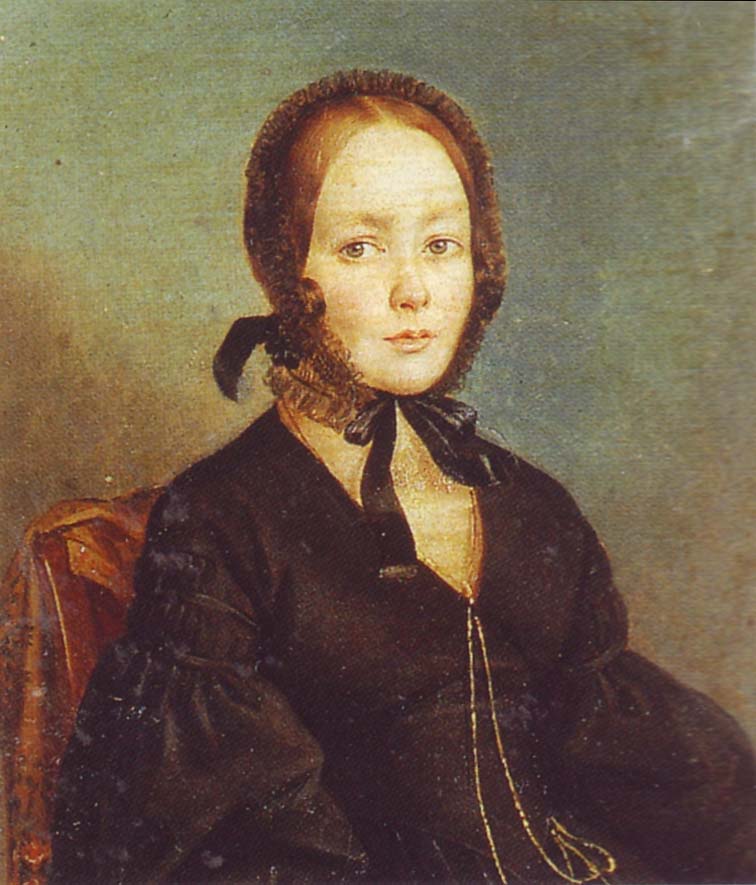 |
| Pushkin's married lover, Anna Petrovna Kern, for whom he probably wrote the most famous love poem in the Russian language. |
Rise as poet and playwright
He stayed in Chișinău until 1823 and wrote two Romantic poems which brought him wide acclaim; The Captive of the Caucasus and The Fountain of Bakhchisaray. In 1823 Pushkin moved to Odessa, where he again clashed with the government, which sent him into exile on his mother's rural estate of Mikhailovskoye (near Pskov) from 1824 to 1826.
In Mikhaylovskoye, Pushkin wrote nostalgic love poems which he dedicated to Elizaveta Vorontsova, wife of Malorossia's General-Governor. Then Pushkin continued work on his verse-novel Eugene Onegin.
In Mikhaylovskoye, in 1825, Pushkin wrote the poem To***. It is generally believed that he dedicated this poem to Anna Kern, but there are other opinions. Poet Mikhail Dudin believed that the poem was dedicated to the serf Olga Kalashnikova.Pushkinist Kira Victorova believed that the poem was dedicated to the Empress Elizaveta Alekseyevna. Vadim Nikolayev argued that the idea about the Empress was marginal and refused to discuss it, while trying to prove that poem had been dedicated to Tatyana Larina, the heroine of Eugene Onegin.
Authorities allowed Pushkin to visit Tsar Nicholas I to petition for his release, which he obtained. However, insurgents in the Decembrist Uprising (1825) in Saint Petersburg had kept some of Pushkin's earlier political poems, and he quickly found himself under the strict control of government censors, unable to travel or publish at will.
During that same year (1825), Pushkin also wrote what would become his most famous play, the drama Boris Godunov, while at his mother's estate. He could not however, gain permission to publish it until five years later. The original and uncensored version of the drama was not staged until 2007.
Around 1825-1829 he met and befriended the Polish poet Adam Mickiewicz, during exile in central Russia. In 1829 he travelled through the Caucasus to Erzurum to visit friends fighting in the Russian army during the Russo-Turkish War.
Around 1828, Pushkin met Natalia Goncharova, then 16 years old and one of the most talked-about beauties of Moscow. After much hesitation, Natalia accepted a proposal of marriage from Pushkin in April 1830, but not before she received assurances that the Tsarist government had no intentions to persecute the libertarian poet. Later, Pushkin and his wife became regulars of court society. They officially became engaged on 6 May 1830, and sent out wedding invitations. Due to an outbreak of cholera and other circumstances, the wedding was delayed for a year. The ceremony took place on 18 February 1831 (Old Style) in the Great Ascension Church on Bolshaya Nikitskaya Street in Moscow. When the Tsar gave Pushkin the lowest court title, the poet became enraged, feeling that the Tsar intended to humiliate him by implying that Pushkin was being admitted to court not on his own merits but solely so that his wife, who had many admirers including the Tsar himself, could properly attend court balls.
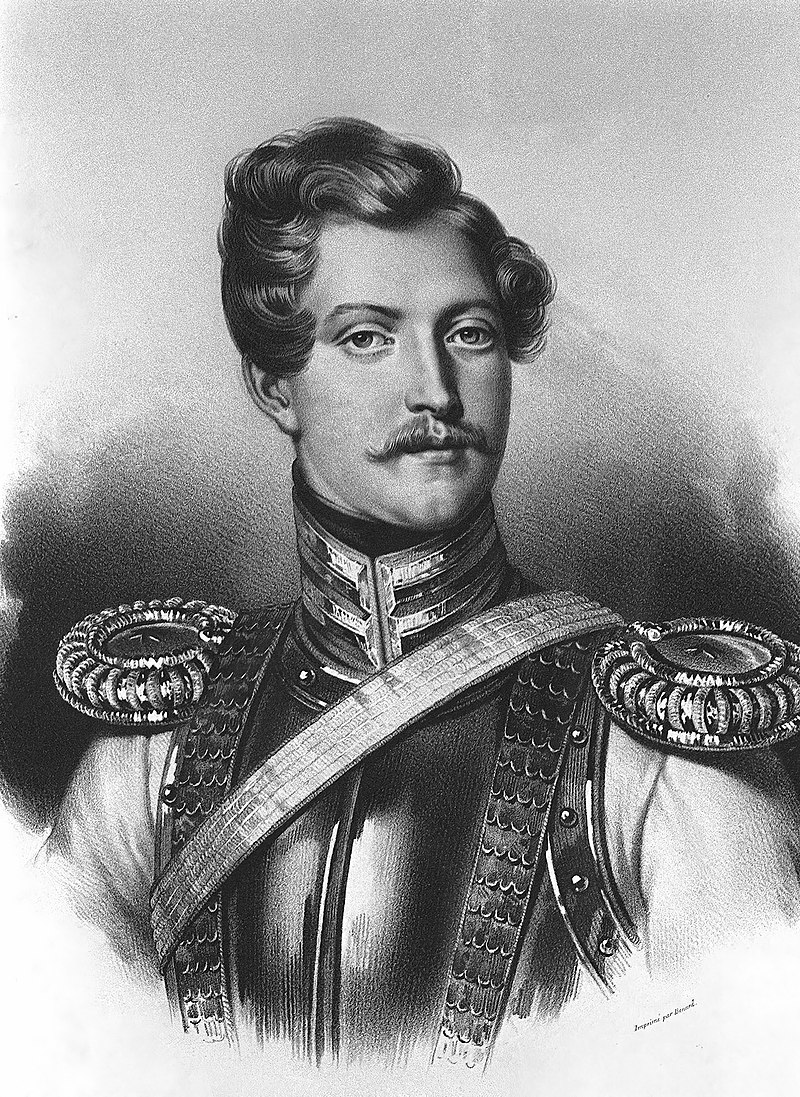 |
Georges d'Anthès |
In the year 1831, during the period of Pushkin's growing literary influence, he met one of Russia's other great early writers, Nikolai Gogol. After reading Gogol's 1831-1832 volume of short stories Evenings on a Farm Near Dikanka, Pushkin supported him and would feature some of Gogol's most famous short stories in the magazine The Contemporary, which he founded in 1836.
Death
By the autumn of 1836, Pushkin was falling into greater and greater debt and faced scandalous rumors that his wife had a love affair. On 4 November he sent a challenge to a duel for Georges d'Anthès (Dantes-Gekkern). Jacob van Heeckeren, d'Anthès' adoptive father, asked the duel be delayed by two weeks. With efforts by the poet's friends, the duel was cancelled. On 17 November Georges d'Anthès made a proposal to Natalia Goncharova's (Pushkina's) sister - Ekaterina Goncharova. The same day Pushkin sent the letter to refuse the duel. The marriage didn't resolve the conflict. Georges d'Anthès continued to pursue Natalia Goncharova in public. Rumors that Georges married Natalia's sister just to save her reputation started to spread. On January 26 (7 February) of 1837 Pushkin sent a "highly insulting letter" to Heeckeren. The only answer for that letter could be a challenge to a duel, and Pushkin knew it. Pushkin received the formal challenge to a duel through his sister-in-law, Ekaterina Gekkerna, approved by d'Anthès, on the same day through the attaché of the French Embassy Viscount d'Archiac. Since Dantes-Gekkern was the ambassador of a foreign country, he could not fight a duel - it would mean the immediate collapse of his career. The duel with d'Anthès took place on January 27 at the Black River. Pushkin was wounded in a hip and the bullet penetrated into the abdomen. At that time that kind of wound was fatal. Pushkin learned about it from the medic Arendt, who did not conceal the true state of affairs. Two days later, on January 29 (February 10) at 14:45 Pushkin died of peritonitis.
By Pushkin's wife's request he was put in the coffin in an evening dress – not in chamber-cadet uniform. The funeral service was assigned to the St. Isaac's Cathedral, but it was moved to Konyushennaya church. The ceremony took place at a large gathering of people. After the funeral, the coffin was lowered into the basement, where it stayed until 3 February, before the departure to Pskov. Alexander Pushkin was buried on the territory of the monastery Svyatogorsk Pskov province. His last home is now a museum.
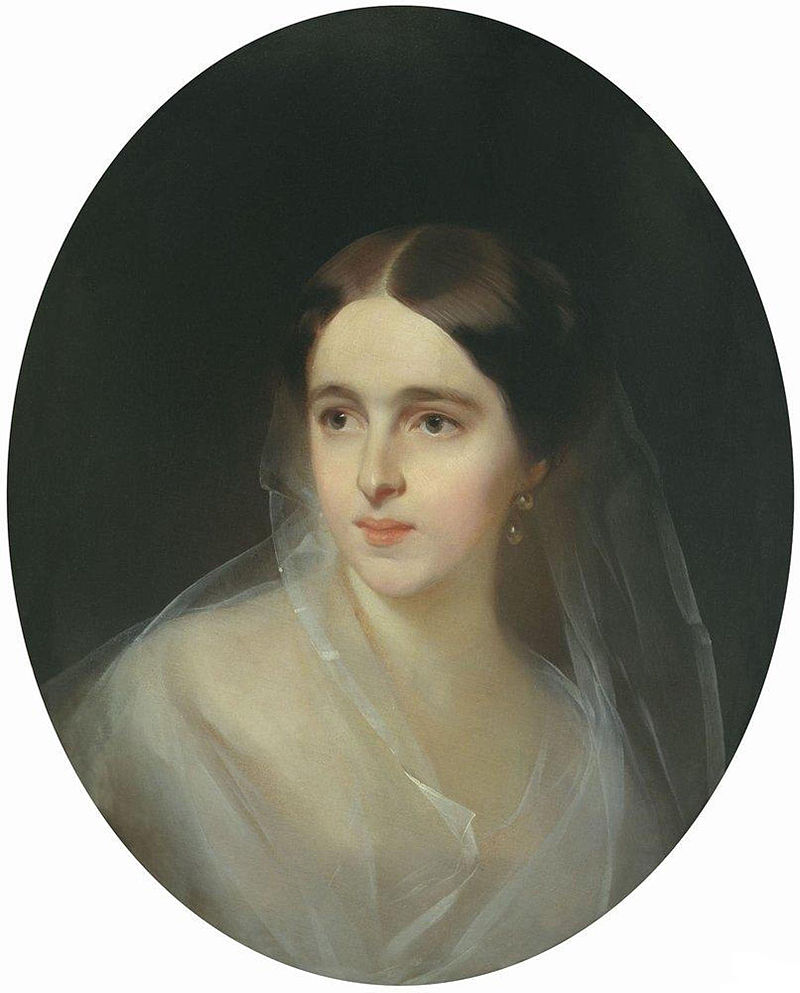 |
| Natalia Goncharova, Pushkin's wife. Painted by Ivan Makarov (1849) |
Pushkin descendants
Pushkin had four children from his marriage to Natalia: Maria (b. 1832), Alexander (b. 1833), Grigory (b. 1835) and Natalia (b. 1836) the last of whom married, morganatically, into the royal house of Nassau to Nikolaus Wilhelm of Nassau and became the Countess of Merenberg.
Of Pushkin's children only the lines of Alexander and Natalia continue. Natalia's granddaughter, Nadejda, married into the British royal family (her husband was the uncle of Prince Philip, Duke of Edinburgh). Descendants of the poet now live around the globe in Great Britain, Czech Republic, Germany, Belgium and the United States
Legacy
Literary legacy
Critics consider many of his works masterpieces, such as the poem The Bronze Horseman and the drama The Stone Guest, a tale of the fall of Don Juan. His poetic short drama Mozart and Salieri (from the same work as The Stone Guest, Little Tragedies) was the inspiration for Peter Shaffer's Amadeus as well as providing the libretto (almost verbatim) to Rimsky-Korsakov's opera Mozart and Salieri. Pushkin is also known for his short stories. In particular his cycle The Tales of the Late Ivan Petrovich Belkin, including "The Shot", were well received. Pushkin himself preferred his verse novel Eugene Onegin, which he wrote over the course of his life and which, starting a tradition of great Russian novels, follows a few central characters but varies widely in tone and focus.
Onegin is a work of such complexity that, while only about a hundred pages long, translator Vladimir Nabokov needed two full volumes of material to fully render its meaning in English. Because of this difficulty in translation, Pushkin's verse remains largely unknown to English readers. Even so, Pushkin has profoundly influenced western writers like Henry James. Pushkin wrote The Queen of Spades, which is included in Black Water, a collection of short stories of a fantastic nature by major writers, compiled by Alberto Manguel.
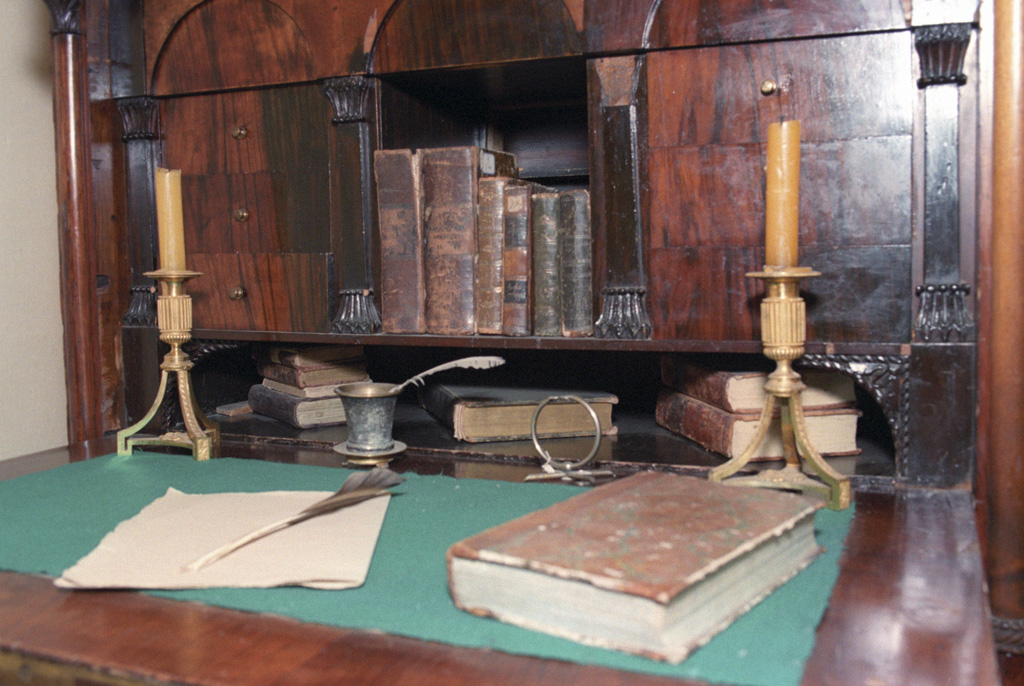 |
Pushkin's writing table |
Musical legacy
Pushkin's works also provided fertile ground for Russian composers. Glinka's Ruslan and Lyudmila is the earliest important Pushkin-inspired opera, and a landmark in the tradition of Russian music. Tchaikovsky's operas Eugene Onegin (1879) and The Queen of Spades (La Dame de Pique, 1890) became perhaps better known outside of Russia than Pushkin's own works of the same name.
Mussorgsky's monumental Boris Godunov (two versions, 1868-9 and 1871-2) ranks as one of the very finest and most original of Russian operas. Other Russian operas based on Pushkin include Dargomyzhsky's Rusalka and The Stone Guest; Rimsky-Korsakov's Mozart and Salieri, Tale of Tsar Saltan, and The Golden Cockerel; Cui's Prisoner of the Caucasus, Feast in Time of Plague, and The Captain's Daughter; Tchaikovsky's Mazeppa; Rachmaninoff's one-act operas Aleko (based on The Gypsies) and The Miserly Knight; Stravinsky's Mavra, and Nápravník's Dubrovsky.
Additionally, ballets and cantatas, as well as innumerable songs, have been set to Pushkin's verse (including even his French-language poems, in Isabelle Aboulker's song cycle "Caprice étrange"). Suppé, Leoncavallo and Malipiero have also based operas on his works.
The Desire of Glory, which has been dedicated to Elizaveta Vorontsova, was set to music by David Tukhmanov (Vitold Petrovsky - The Desire of Glory on YouTube), as well as Keep Me, Mine Talisman - by Alexander Barykin (Alexander Barykin - Keep Me, Mine Talisman on YouTube) and later by Tukhmanov.
Romanticism
Pushkin is considered by many to be the central representative of Romanticism in Russian literature; however, he can't be labelled unequivocally as a Romantic. Russian critics have traditionally argued that his works represent a path from Neoclassicism through Romanticism to Realism. An alternative assessment suggests that "he had an ability to entertain contrarities [sic] which may seem Romantic in origin, but are ultimately subversive of all fixed points of view, all single outlooks, including the Romantic" and that "he is simultaneously Romantic and not Romantic".
 |
| Monument to Alexander Pushkin in Bakhchysarai, Crimea |
Influence on the Russian language
According to Vladimir Nabokov,
Pushkin's idiom combined all the contemporaneous elements of Russian with all he had learned from Derzhavin, Zhukovsky, Batyushkov, Karamzin and Krylov; these elements are :
The poetical and metaphysical strain that still lived in Church Slavonic forms and locutions;
Abundant and natural gallicisms;
The everyday colloquialisms of his set; and
Stylized popular speech. He made a salad of the famous three styles (low, medium elevation, high) dear to the pseudoclassical archaists, and added to it the ingredients of Russian romanticists with a pinch of parody.
Pushkin is usually credited with developing Russian literature. Not only is he seen as having originated the highly nuanced level of language which characterizes Russian literature after him, but he is also credited with substantially augmenting the Russian lexicon. Where he found gaps in the Russian vocabulary, he devised calques. His rich vocabulary and highly sensitive style are the foundation for modern Russian literature. His accomplishments set new records for development of the Russian language and culture. He became the father of Russian literature in the 19th century, marking the highest achievements of the 18th century and the beginning of literary process of the 19th century. Alexander Pushkin introduced Russia to all the European literary genres as well as a great number of West European writers. He brought natural speech and foreign influences to create modern poetic Russian. Though his life was brief, he left examples of nearly every literary genre of his day: lyric poetry, narrative poetry, the novel, the short story, the drama, the critical essay, and even the personal letter.
Pushkin's work as a journalist marked the birth of Russian magazine culture which included him devising and contributing heavily to one of the most influential literary magazines of the 19th century, the Sovremennik (The Contemporary, or Современник). Pushkin inspired the folk tales and genre pieces of other authors: Leskov, Yesenin and Gorky. His use of Russian language formed the basis of the style of novelists Ivan Turgenev, Ivan Goncharov and Leo Tolstoy, as well as that of subsequent lyric poets such as Mikhail Lermontov. Pushkin was analyzed by Nikolai Gogol, his successor and pupil, and the great Russian critic Vissarion Belinsky who has also produced the fullest and deepest critical study of Pushkin's work, which still retains much of its relevance.
 |
Alexander Pushkin statue, St. Petersburg, Russia |
Aleksandr Sergeyevich Pushkin; 1799 - 1837) là một nhà thơ, nhà văn, nhà viết kịch nổi tiếng người Nga. Được tôn vinh là đại thi hào, Mặt trời thi ca Nga, ông đã có những đóng góp to lớn trong việc phát triển ngôn ngữ văn học Nga hiện đại và là biểu tượng của dòng văn học lãng mạn Nga thế kỷ 19 bởi nhiều cống hiến trong sự đa dạng hóa ngôn ngữ văn chương.
Thời thơ ấu
 |
Chân dung thời thơ ấu của A.S.Pushkin |
Pushkin sinh ngày 6 tháng 6 năm 1799 (26 tháng 5 theo lịch cũ) tại thành phố Moskva trong một gia đình quý tộc Nga có nguồn gốc từ thế kỷ 12.Cha của Pushkin, ông Pushkin Sergei Levova, là hậu duệ của dòng dõi gia đình Boyar cũ - tước hiệu cao cấp nhất trong tầng lớp quý tộc của Nga và Romania thời xưa. Ông vốn là một chủ đất giàu có, sở hữu nhiều đất đai và nô lệ. Tuy nhiên, ông Sergei Levova lại luôn cảm thấy xấu hổ vì điều này. Dường như người cha của Pushkin không phù hợp với công việc của một người quản lý. Ông rất ít quan tâm đến những khái niệm như gia đình, thu nhập và giá cả nông sản. Cả cuộc đời của Sergei Levova sống trong cảnh thảnh thơi, nhàn nhã và vô lo với tài hoạt ngôn trên các diễn đàn đông người, ưa tìm hiểu ngôn ngữ Pháp và Nga, quan tâm tới văn học và có một thư viện gồm những cuốn sách tiếng Pháp giá trị. Với con cái, ông Sergei Levova cũng rất ít thể hiện sự quan tâm đặc biệt nhưng cơ bản là một người cha tốt. Vợ ông Sergei Levova, đồng thời là mẹ Pushkin, bà Nadezhda Osipovna, thuộc dòng dõi của Abram Petrovich Gannibal, một người nô lệ da đen, nhờ thông minh xuất chúng và có những đóng góp lớn về quân sự, hàng hải cho nước Nga đã được Pyotr Đại đế nhận làm con nuôi. Vì thế, Pushkin có vài đặc điểm giống đằng ngoại như tóc rất xoăn, làn da ngăm đen và đôi môi dày. Trái với bản tính vô lo của chồng, bà Sergei Levova là một phụ nữ xinh đẹp nhưng chuyên quyền, độc đoán. Ba người con, con gái lớn Olga, rồi đến Pushkin và cuối cùng là em út Leo thì chỉ có Leo là được nuông chiều hơn cả. Chị em Pushkin thường bị mẹ dạy bằng roi vọt và bà mẹ đặc biệt lạnh lùng với cậu con trai thứ. Có thời điểm quá tức giận, thậm chí bà còn không nói chuyện với Pushkin tới hàng tuần, thậm chí cả tháng. Trong thời gian cai sữa cho Pushkin, bà mẹ đã bỏ mặc cậu bé đói khát mút tay và không âu yếm cậu bé như những bà mẹ khác. Vì thuở nhỏ Pushkin rất mập mạp, vụng về, bà mẹ đã bắt cậu phải vận động, chạy nhảy, chơi đùa với bạn bè cùng trang lứa. Trái lại, bà ngoại của cậu, bà Maria Alexeevna Gannibal lại là một phụ nữ rất hiền từ. Thời thơ ấu, trong những tháng hè, Pushkin thường được về chơi với bà ngoại tại ngôi làng nhỏ Zakharov, gần thành phố Zvenigorod, ngoại ô Moskva. Những tháng ngày êm đềm ở đây về sau này được phản ảnh trong những bài thơ đầu tiên của Puskin ("Thầy tu", 1813; "Bova", 1814; "Lời nhắn cho Yudin", 1815; "Giấc mơ", 1816).
Thời niên thiếu
 |
| Chân dung thời niên thiếu của A.S.Pushkin |
Sáu tuổi, Pushkin được tuyển vào trường Lyceum Hoàng gia, tại Tsarskoe Selo (Hoàng Thôn, nay là thị trấn Pushkin) gần kinh đô Sankt-Peterburg. Thời gian theo học tại đây ông đã chứng kiến cuộc chiến tranh giữa quân đội Nga hoàng với quân Pháp của Napoléon I (1812). Ông có bài thơ nổi tiếng về chủ đề này - "Hồi ức ở Hoàng Thôn" (Воспоминание о Царском Селе, 1815). Bài thơ này đã được nhà phê bình văn học Nga nổi tiếng thời bấy giờ là Gavrila Romanovich Derzhavin (Гаври́л Рома́нович Держа́вин) coi là một tác phẩm kiệt xuất và đã tôn vinh Pushkin, khi đó mới 16 tuổi, như một nhà thơ lớn của nước Nga.
 |
| Pushkin đọc thơ trước Derzhavin năm 16 tuổi |
Sau khi tốt nghiệp Lyceum, Pushkin tích cực tham gia vào các hoạt động văn học nghệ thuật của giới quý tộc trí thức trẻ tại Sankt-Peterburg, lúc bấy giờ đang nỗ lực đấu tranh cho một cuộc cách mạng xoá bỏ chế độ nông nô tại Nga. Thời gian này ông cho ra đời những bài thơ mang tính chính trị như "Gửi Chaadaev" (К Чаадаеву, 1818), "Gửi N. Ya. Plyuskova" (Н. Я. Плюсковой, 1818), "Làng quê" (Деревня, 1819)... Năm 1820 Pushkin cho in bản trường ca đầu tiên của mình - "Ruslan và Lyudmila" (Руслан и Людмила) và ngay lập tức tạo được tiếng vang lớn về phong cách cũng như chủ đề, mặc dù cũng phải chịu sự công kích dữ dội từ phía chính quyền.
Đi đày
Mùa xuân 1820, do những bài thơ cách mạng, thống đốc Sankt-Peterburg, bá tước M. Miloradovich, đã quyết định đày Pushkin tới Sibir. Tuy nhiên nhờ sự giúp đỡ và ảnh hưởng của những người bạn (Nikolai Mikhailovich Karamzin, Pyotr Yakovlevich Chaadayev, Fyodor Nikolayevich Glinka), cuối cùng ông chỉ phải chịu mức án nhẹ hơn là bị trục xuất khỏi thành phố Sankt-Peterburg vô thời hạn. Sau khi rời Sankt-Peterburg, Pushkin đã đi xuống miền nam nước Nga, tới Kavkaz và Krym, Moldova, Kiev. Trong thời gian này ông vẫn tiếp tục cho ra đời những tác phẩm mới có ảnh hưởng rất lớn tới văn học Nga thế kỷ 19, như "Người tù binh Kavkaz" (Кавказский пленник, 1822), "Gavriiliada" (Гавриилиада, 1821), "Anh em lũ cướp" (Братья разбойники, 1822), "Đài phun nước Bakhchisaraysky" (Бахчисарайский фонтан, 1824). Năm 1823, ở Kishinov, Pushkin bắt tay vào viết tiểu thuyết bằng thơ, kiệt tác "Yevgeny Onegin" (Евгений Онегин).
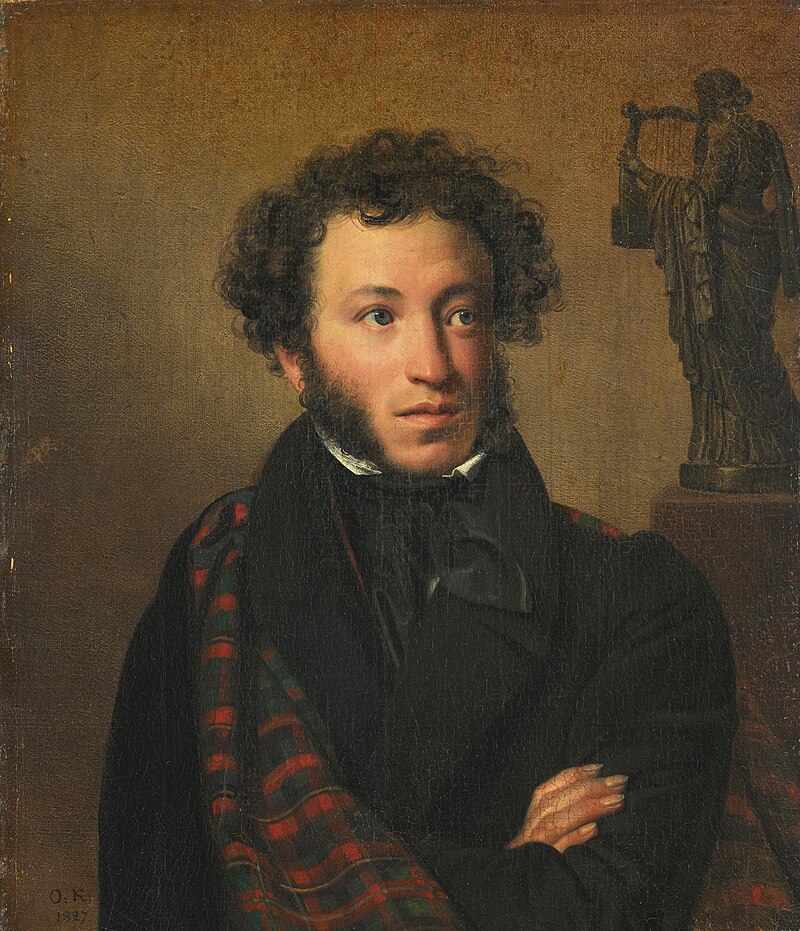 |
| Pushkin qua nét vẽ của Orest Adamovich |
Tháng 7 năm 1824, với đơn xin ân xá, Pushkin được chính quyền cho phép về ở khu trang trại Pskov tại vùng Mikhailovskoe dưới sự kiểm soát của gia đình. Tại Mikhailovskoe ông đã sáng tác những tác phẩm lịch sử như vở kịch "Boris Godunov" (Борис Годунов, 1825), "Với biển cả" (К морю, 1826), trường ca "Những người Digan" (Цыганы, 1827).
Năm 1825, trong lần sang thăm trang trại láng giềng, Pushkin đã gặp nàng Anna Kern, người tạo cho ông cảm hứng để sáng tác bài thơ nổi tiếng "Gửi K". Cuối năm 1825 đầu năm 1826 kết thúc chương năm và sáu của "Evgeny Onegin", mà lúc đó Puskin coi là đoạn kết cho phần một của tác phẩm.
 |
| Tượng Pushkin ở Moskva |
Cuối năm 1825, thông qua một số viên chức có thiện chí, Pushkin đã được tiếp cận Nga hoàng Nikolai I để đệ đơn xin ân xá và được Nga hoàng chấp thuận. Tuy nhiên sau thất bại của cuộc khởi nghĩa Tháng Chạp năm 1825 tại Sankt-Peterburg, chính quyền đã xem xét lại tất cả các ấn phẩm chống đối chính quyền của Pushkin trước đó và quyết định buộc ông bị quản thúc tại gia và có chính sách kiểm duyệt nghiêm khắc các tác phẩm của nhà thơ. Pushkin đã chuyển về Moskva sống trong thời gian này.
Năm 1831 được đánh dấu bởi một sự kiện rất quan trọng trong sự nghiệp của Pushkin, ông đã có buổi gặp gỡ với Nikolai Vasilyevich Gogol, một nhà văn Nga nổi tiếng khác. Cả hai nhanh chóng trở thành bạn thân và luôn hỗ trợ nhau trong hoạt động nghệ thuật. Puskin đã có ảnh hưởng lớn tới những nhân vật trong các tác phẩm châm biếm phê phán hiện thực của Gogol.
Cùng năm 1831, Pushkin kết hôn với người đẹp Natalia Goncharova, người đã đem lại cho ông cảm hứng sáng tác lớn lao. Ông hoàn tất chương "Bức thư của Onegin" trong tác phẩm "Evegeny Onegin" và cũng là chương kết của công trình vĩ đại mà nhà thơ đã mất 8 năm để thực hiện.
Trở lại Sankt-Peterburg
Tháng 11 năm 1833, Puskin trở lại Sankt-Peterburg, và cảm thấy cần phải có những thay đổi lớn trong cuộc sống, ông không muốn bị kìm kẹp trong bốn bức tường do chế độ quản thúc.
Nhờ sự sủng ái của Nga hoàng Nikolai I, đầu năm 1834 chế độ quản thúc đối với Pushkin được nới lỏng, tuy nhiên các tác phẩm thơ ca của ông vẫn phải có sự đồng ý của Sa hoàng mới được phát hành. Do vậy hoàn cảnh kinh tế của nhà thơ không được thuận lợi, Pushkin phải đăng ký vào một chức vụ thư lại trong viện biên sử của Sa hoàng. Thời kỳ này, Puskin chuyển hướng sang viết văn xuôi. Ông sáng tác truyện vừa như "Con đầm bích" (Пиковая дама), tiểu thuyết như "Dubrovski" (Дубровский, 1832-33), "Con gà trống vàng", "Người da đen của Pyotr Đại đế" (không hoàn thành)...
Cùng với những người bạn, Pushkin đã thành lập tờ tạp chí Người đương thời (Современник). Nhiều tác giả nổi tiếng của Nga thời bấy giờ như Aleksandr Ivanovich Turgenev, N.V. Gogol, V.A. Zhukovski, P.A. Vyazemski đã ủng hộ bằng cách gửi những tác phẩm mới nhất của mình tới cho tạp chí này. Tuy nhiên, độc giả Nga khi đó chưa quen với những bài viết mang tính phê phán hiện thực sâu sắc đã không hưởng ứng tạp chí Người đương thời. Số lượng độc giả quá ít khiến ban biên tập lâm vào tình thế rất khó khăn, họ không có đủ tiền để trang trải cho việc in ấn và thù lao cho cộng tác viên. Hai số cuối của tạp chí có đến quá nửa là sáng tác của Pushkin, phần lớn là để vô danh. Tiểu thuyết "Người con gái viên đại úy" (Капитанская дочка) chính là được in trên tạp chí này.
Đấu súng
 |
Vợ của Puskin, Natalia Goncharova |
Vợ của Pushkin - Natalia Goncharova là một phụ nữ đẹp và quý phái vì vậy luôn có rất nhiều người ái mộ, trong số đó có cả Nga hoàng Nikolai I. Trong khi đó Puskin, do nguồn gốc châu Phi của mình, lại có một bề ngoài không mấy bắt mắt. Điều này làm cho Puskin rất khó chịu và không ít lần cảm thấy bực bội.
Năm 1837, do những tin đồn thất thiệt về quan hệ ngoại tình của vợ mình với Georges d'Anthès, một sĩ quan kỵ binh trong quân đội Sa hoàng, Puskin đã thách đấu súng với viên sĩ quan trẻ tuổi này. Cuộc đọ súng đã kết thúc hết sức bi kịch khi cả hai đối thủ đều bị thương, nhưng Puskin đã bị trọng thương và qua đời hai ngày sau đó - ngày 10 tháng 2 năm 1837 (29 tháng một trong lịch Julian).
Bộ phim Pushkin. Ngày quyết đấu công chiếu năm 2006 của đạo diễn Natalya Sergeyevna Bondarchuk đã tập trung quanh vụ đấu súng này.

No comments:
Post a Comment